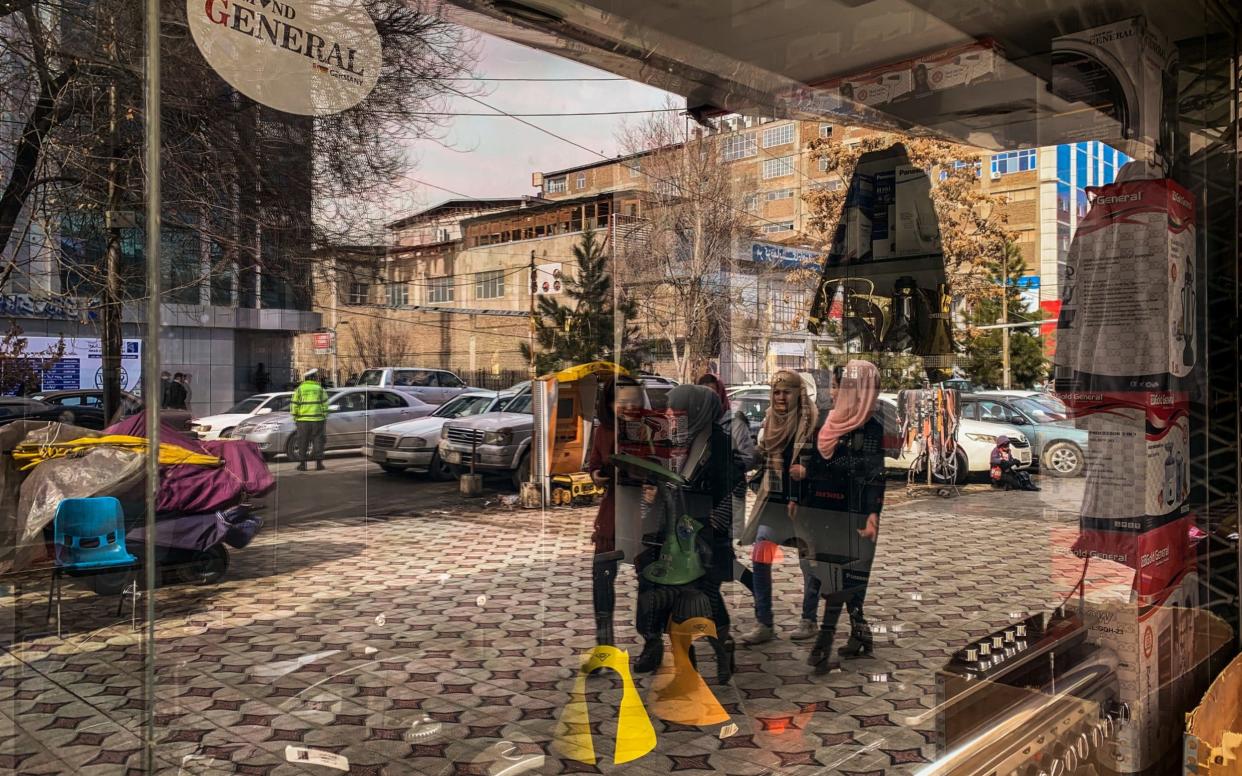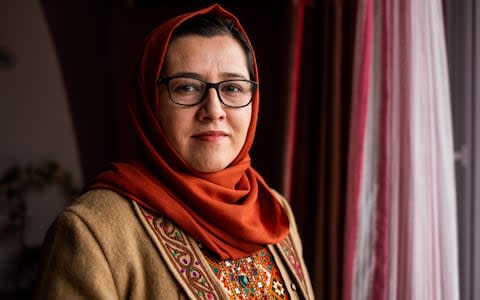Women in Afghanistan fear a return to oppression as they are left out of peace talks with Taliban

The Taliban extinguished Kamila Sidiqi's hopes of becoming a teacher the day she graduated from training college.
As she proudly received her qualification in September 1996, Taliban militiamen entered her home city of Kabul to begin their forbidding five-year-long rule.
Overnight, a place at university or a job were out of the question for the 18-year-old. Girls' education and women's employment were banned. She could not leave the house without a burka and chaperone.
The effect of that claustrophobic oppression on a headstrong teenager and their enforcement by stick-wielding morality police still evoke powerful memories.
“When I was young in the Taliban time, I tasted it, I felt it,” she told the Telegraph last week.
But the Taliban failed to curb Ms Sidiqi's entrepreneurial spirit and she went on to form her own tailoring business employing 150 seamstresses working at home. And she eventually rose to become deputy minister for commerce.

Yet the strictures of that era are now very much in her mind and the minds of many Afghan women.
For the first time since the Taliban took up arms after being ousted by the United States in retaliation for the attacks on 9/11, there is the tentative prospect of a political settlement to the Afghan conflict.
Taliban leaders are sitting down with US officials and separately with Afghan politicians in the most promising political development of their bloody, 17-year-long insurgency.
A deal holds the long-dreamed-of possibility for an end to a conflict that is estimated to have killed at least 25,000 Afghan civilians since 2009 and 45,000 Afghan troops since 2015.
But many Afghan women also fear that a compromise with the hardline Islamic movement may come at the cost of a return to the oppression of their regime. They are also worried that they may end up with no say in negotiations about their futures.
“As a woman, as a mother, I am really happy that there is a very serious talk about peace in this country. All Afghans, men and women, Taliban and the government, everyone wants peace. That's very good news for me,” Mrs Sidiqi said, speaking in her ministerial office.
“The main concern and problem from the beginning when discussions started between the Taliban and the government is that there is no women in these discussions. My concern is, why are there not women?”
“The prospect of turning back the clock is inconceivable,” said Mrs Sidiqi, whose struggles to run a business under the Taliban were chronicled in the bestselling book The Dressmaker of Khair Khana. “I am not the 18-year-old Kamila Sidiqi who accepted all those rules and regulations ... Today I am a different Kamila Sidiqi.”
She went on: “This is something we are really serious about. We are not going back. This is 51 per cent of the population.”
Her concerns are echoed by Humaira Rasuli, founder of Women for Justice, which provides legal support to Afghan women. When dozens of Afghan opposition politicians and Taliban envoys met for talks in a Moscow hotel earlier this month only two women were there.
“When it comes to women's rights, Afghan women really do not know what will be the situation after peace with the Taliban. There's no representation of women and the politicians there are more interested in their share of power after peace,” she said.
Across town, the man who once oversaw the Taliban's notorious religious enforcers claims the movement has changed.
Qalamuddin Mohmand was deputy minister at the Ministry for Promotion of Virtue and Prevention of Vice, but after being locked in Bagram US military prison when the Taliban regime fell, he now heads a conservative religious party.
He was present in Moscow when the Taliban spelled out their stance on some of the most contentious issues for negotiations, including the constitution and women's rights.
In a statement the militant movement said it was committed to guaranteeing women their rights under Islam. Islam grants women rights in areas including “business and ownership, inheritance, education, work, choosing one’s husband, security, health, and the right to a good life”, the declaration said. But it also criticised “so-called women's rights activists” and insisted protections could not threaten “Afghan values”.
Mr Mohmand claimed even in the 1990s the Taliban wanted to educate girls, but conditions were too insecure. He told the Telegraph his former Taliban associates have changed and no longer wanted to restore their former emirate.

“There will be a lot of change from that time to now,” he said. “Even in that time, we were not against sending girls to school, but there was no opportunity. There was no transport, there were no women's teachers, there were no separate schools. We were not against the education of women.”
Abdul Hakim Mujahid, another former Taliban official, added: “Even the women participants [in Moscow] were happy with the policy of the Taliban, because they declared clearly that they can work, that they can get educated, they can make their business. Only a small clause was there: according to Islamic teaching.”
Such commitments do little to reassure Orzala Nemat, who ran secret literacy classes for women during the Taliban regime and now heads a Kabul-based think tank.
Islamic protections for women are open to interpretation and the Taliban's track record is not good.
“When they say the framework of Islam, maybe it is very different to what I believe is the framework of Islam. I had a very clear definition of Islam and Islamic values then, I have it now and I don't allow a bunch of people who are using terror as a weapon to define for me what is Islam and what is non-Islamic,” she said.

Despite equality being enshrined in the constitution drawn up after Taliban rule, Afghanistan was named the worst place in the world to be a woman in a recent poll of activists. Illiteracy, poor health care and oppression remain rife, particularly in rural areas.
The Taliban may not even be the biggest problem, some women fear. The warlords who tore Afghanistan apart in the 1990s, before Taliban rule, often oversaw terrible abuses against women.
Many of those militia commanders, or their heirs, are now back in power and several were present at the Moscow talks. Those leaders are unlikely to protect women and may want to turn back the clock themselves, Ms Nemat said.
“There are lots of opportunistic, misogynistic men, who are are just looking for an opportunity to disregard us and say, you know what, it was the Taliban.”
The dream of peace after 40 years of conflict is so cherished, there is also optimism, she said. But that optimism is shadowed by misgivings.
“If there is an opportunity to stop the bloodshed, that's a sign of optimism for us. But we are also shadowed hugely by fears and concerns because we are now again apparently at a turning point where the first thing that appears to be compromised is the women's rights and the women's position.”
Protect yourself and your family by learning more about Global Health Security

